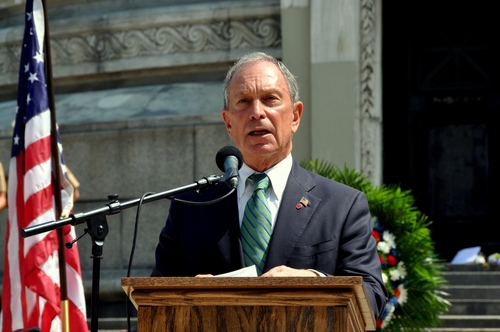Many of us have been intrigued — even excited — by former New York City Mayor Michael Bloomberg’s potential (late) entry into the 2016 presidential races.
Some of us have even been trying to divine what impact Bloomberg’s candidacy — whether as a Democrat or Independent — would have on the elections landscape.
Over at TIME Magazine, Michael Scherer, not only provides some pretty good insights on such a possibility but also on the Mayor himself.
First, on Bloomberg:
The current chief executive of his own media empire, Bloomberg, 73, was elected three times to lead New York City. He holds a number of political positions that are sure to turn off Republicans while enticing Democrats and socially-liberal independents in a general election. These include support for stricter gun control, greater government regulation to protect public health and strong support for the women’s health organization, Planned Parenthood. He has also worked to shutter coal power plants as a way to combat global warming, and spent his own money on an outside group supporting immigration reform, with a path to citizenship for those now in the country without documentation.
Scherer mentions Bloomberg’s $37 billion fortune, out of which he gave nearly $29 million in the 2014 election cycle “to groups involved in elections, including $4 million to Planned Parenthood Votes and millions more to a Super PAC supporting Democratic House candidates.”
BTW 1: Bloomberg’s worth is anywhere between four and nine times larger than the “I am very, very rich, you know,” Donald Trump’s — depending on whether one believes Trump or Forbes.
BTW 2: To date, Mike Bloomberg has donated more than $3 billion to a wide variety of causes and organizations. In 2015, Bloomberg Philanthropies distributed $510 million. Someone please look up how much the “make-your-head-spin” Trump has donated.
Bloomberg has previously explored a run for the presidency, but decided against it because “the partisan primary and caucus system, which runs through rural states like Iowa and New Hampshire, would be unfavorable to a billionaire bachelor from New York City, with close ties to Wall Street.”
However, “the rise of Republican Donald Trump and Democrat Bernie Sanders has again sparked his interest in an independent run, which would bring echoes of H. Ross Perot’s 1992 campaign against Republican George H. W. Bush and Democrat Bill Clinton.”
Now, what is the probability that Bloomberg will toss his hat in, what will be the impact and what are his chances?
First, Scherer says that Bloomberg “is most likely to pursue a campaign…if Clinton fails over the next month to demonstrate that she is on a clear path to secure the Democratic nomination.”
Then Scherer quotes a person “with knowledge of Bloomberg’s plans” that Bloomberg still might run if Clinton appears likely to be the nominee, but that in such an event a campaign was “significantly less likely…but not impossible.”
Scherer refers to this prospect as one “that could prove a major boost to Republican hopes of retaking the White House.”
On what impact Bloomberg’s entry would have on the race for the White House, Scherer says that, although Bloomberg has commissioned private polls as he explores a run, “there is little public polling on the impact of a Bloomberg presidency on the election.”
However, “An online poll conducted this month by Morning Consult found that Bloomberg’s entrance could hurt Clinton more than Trump, in a hypothetical three-way race.” But Scherer cautions, “Online polls are considered less accurate by many pollsters than telephone polls, and general election matchup polls this early in a campaign cycle are rarely predictive.”
(NBC News reports on an online Morning Consult poll conducted Jan. 21-24, where “a Trump-Sanders-Bloomberg three-way race gets you a statistical tie — Sanders 35%, Trump 34%, and Bloomberg 12%. That’s almost identical to what the same poll (conducted Jan. 14-17) found in a Trump-Clinton-Bloomberg matchup — Trump 37%, Clinton 36%, Bloomberg 13%.”)
According to Scherer, “Bloomberg is likely to make his decision before the end of March, so that he can qualify for ballots around the country.”
Scherer concludes:
If he did run, Bloomberg would likely campaign as he did in New York City, as an exceptional manager without the ideological biases of the current two party system. “My strengths are attracting good people and getting them to work together, getting the resources for them, adjudicating disputes, bringing them down to reality, evaluating them, promoting them, and protecting them,” Bloomberg previously told TIME.
While even Bloomberg’s exploration “is bad news for Clinton” who now trails Sanders in New Hampshire and is watching her lead shrink in Iowa, Scherer adds, “Nonetheless, Clinton remains the favorite to win the nomination, given her support among unelected Democratic convention delegates and minority communities.”
What are Hillary Clinton’s thoughts?
When asked about a possible Bloomberg run on “Meet the Press” yesterday, Clinton responded, “He’s a good friend of mine. The way I read what he said is if I didn’t get the nomination, he might consider it. Well, I’m going to relieve him of that and get the nomination so he doesn’t have to.”
How about Bernie Sanders? Again, during “Meet the Press”: “If Donald Trump wins and Mr. Bloomberg gets in, you’re going to have two multi-billionaires running for president of the United States against me. And I think the American people do not want to see our nation move toward an oligarchy where billionaires control the political process. I think we’ll win that election.”
BTW 3: This author has an immense amount of respect for the former New York mayor and welcomes his entry — hopefully as a Democrat — into what is a chaotic campaign, bringing some sanity and some better choices for more Americans.
Lead photo: LEE SNIDER PHOTO IMAGES / Shutterstock.com

















